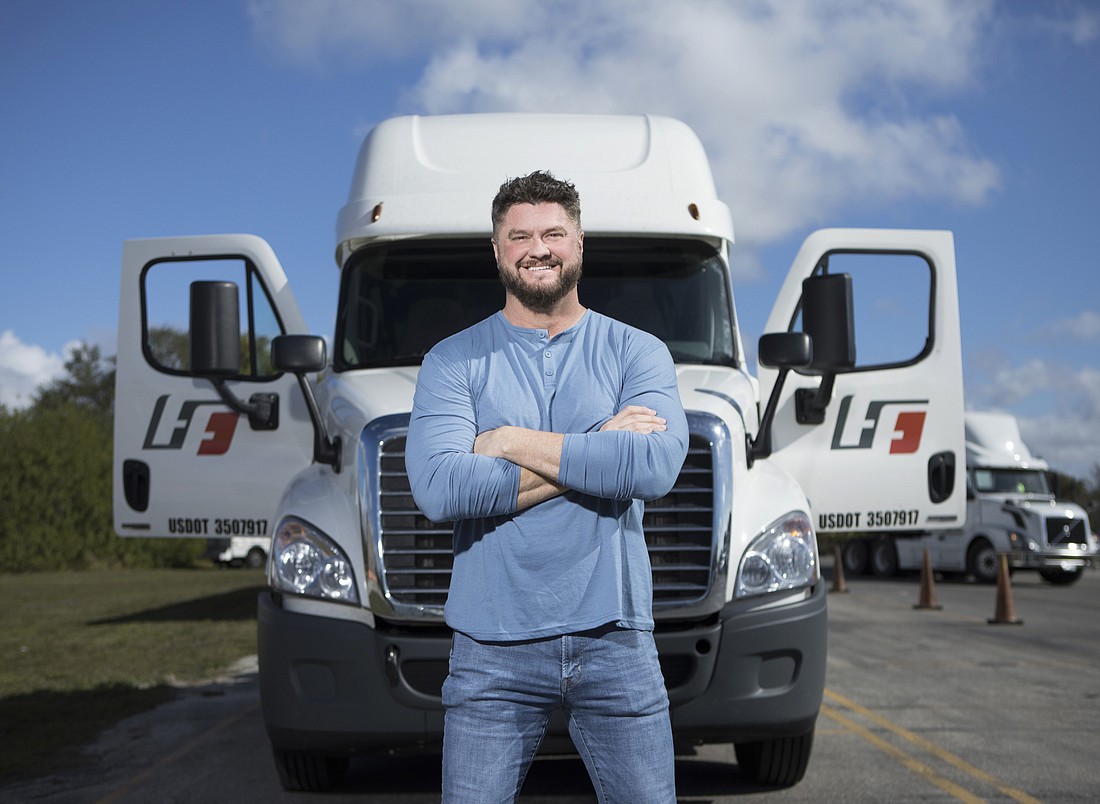- December 27, 2024
-
-
Loading

Loading

Tra Williams, owner and CEO of FleetForce Truck Driving School in Winter Haven, is on the front lines of the supply-chain crisis that has unfolded amid the pandemic. Bottlenecks and delays at ports around the country have been exacerbated by a nationwide shortage of truck drivers. But Williams, 48, who bought the company, formerly known as NBI Truck Driver Training, last year, has big ideas about how to attract more people to the industry. He’s teamed up with the Florida Trucking Association to launch a pre-hire tuition scholarship program for people who want a job driving a big rig or other commercial vehicle but can’t afford FleetForce’s $6,500 fee.
The average annual wage for truck drivers has surged in recent years, to $78,000, Williams says. And students who successfully complete FleetForce’s four-week commercial driver’s license certification course are guaranteed a job thanks to the school’s corporate partnerships with several commercial trucking companies.
"The trucking industry got itself in a disposition of being at a shortage because they didn't really control the narrative the way they should have about what it means to be a professional driver." — Tra Williams, owner and CEO of FleetForce Truck Driving School
The program has been a boon for FleetForce, which, Williams says, saw its gross revenue rise by 60% in 2021. (He declines to provide specific revenue figures.) “We will triple in size in 2022,” he says, “and we’ll go from two locations to six locations. Since we announced this program on Nov. 29, we’ve had more than 2,000 applications. We’re drinking from a firehose right now.”
Williams predicts the supply-chain crisis will get worse before it gets better. The carriers with which FleetForce partners — major trucking companies such as Knight Enterprises and Heartland Express — collectively have more than 1,000 job openings, as the industry's workforce skews older and is susceptible to burnout.
“But every day,” he says, “that number grows. About 1,200 truckers retire in America every single week. And I assure you, we are not licensing that many [new drivers]. We are falling behind just to replace the drivers who are leaving the industry, and so we’re not meeting future demand based on economic growth. If I could train 1,000 people and license them tomorrow, every one of them would have a job waiting for them.”
Williams notes that the logistics sector’s woes were long in the making — not just something that popped up from the pandemic.
“Carriers should be investing in people’s future,” he says. “The trucking industry got itself in a disposition of being at a shortage because they didn't really control the narrative the way they should have about what it means to be a professional driver. I want to dispel the myth that trucking is for low-skill, low-education, low-wage folks, because it is the opposite of that.”
Trucking companies, Williams adds, have also done a poor job of recruiting female drivers.
“There is no wage gap in this industry,” he says. “A mile is a mile. Women are less likely to get impatient and have road rage, so they’re cheaper to insure. They also change jobs less often. So, the carriers we work with, they don't hesitate to hire women.”
FleetForce set a goal of 20% female enrollment in 2020, Williams says, and surpassed it, with 22%. “One in five is not terrible for an industry that’s male dominated. We are hoping to hit 25% next year.”
FleetForce can train about 100 drivers per month — 50 at its main campus in Winter Haven and 50 at a secondary location at the State College of Florida’s Bradenton campus. (It also derives a significant amount of revenue, Williams says, from on-site training at its corporate partners’ facilities nationwide.) In the first quarter of 2022, FleetForce will open a third training facility at the SCF's Venice campus.
“The small and mid-tier markets, those are the people who need this,” Williams says. “They’re two-income families getting by on 50, 60 grand a year; maybe they’ve got two or three kids. They can come through FleetForce and five weeks later, I’ll have three job offers for them paying $65,000 per year.”
Williams expects 2022 to be a year of reckoning for companies not doing enough to keep employees satisfied, and trucking firms, in particular, have a chance to appeal to disgruntled workers in other industries who have quit their jobs amid The Great Resignation.
“I think there are a lot of good companies doing it right,” he says. “The trucking industry is no different than every other industry in America. Of course, there are some employers out there who don't compensate their people or treat them the way they should be treated. It's that way in retail; it's that way in real estate; it's that way in everywhere. But I will say that there is a tidal wave of really good [trucking] companies who recognize drivers are their greatest asset and they're treating them accordingly.”
One of those firms, Alabama-based R.E. Garrison Trucking, which has a partnership with FleetForce, has gone so far as to offer a “concierge” for its drivers. “While you're out on the road, maybe your teenager calls because they ran out of gas. [The driver concierge] will find somebody to go take them some gas,” Williams says. “Maybe your babysitter cancels on you. They'll help you find a babysitter. It's an amazing program. When they told me about it, I was blown away. I’m a big fan of those guys.”
— Brian Hartz